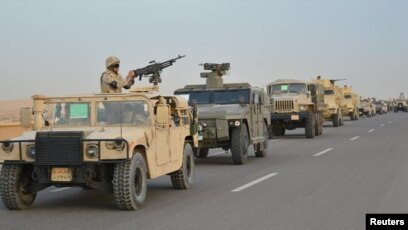Author: Allison Mcmanus
Affiliation: Center for Global Policy
Organization/Publisher: Carnegie Endowment for International Peace/ Sada Middle East Analysis
Date/Place: June 30, 2020/ Washington, D.C., USA
Type of Literature: Article
Word Count: 1835
Link: https://carnegieendowment.org/sada/82218
Keywords: Egypt, Military, Terrorism, North Sinai, Containment Strategy
Brief:
Allison Mcmanus discusses the Egyptian military’s strategy towards terrorism and the militant threat in North Sinai. She argues that the Egyptian Armed Forces’ (EAF) strategy in fighting terrorism is containment rather than eradication of terrorism. Allison justifies adopting a containment strategy due to the nature of the EAF’s dual role as both political and military player that restricts its ability to create a ‘dynamic force’ to combat the threat. Additionally, sustaining the military presence is costly in many ways including casualties, increased suffering of the public which raises the probability of militant recruitment, and the increasing scope of the militant penetration. She underlines the political and institutional challenges that confront the EAF. From an institutional perspective, the strategic decision-making power centralized in the members of the Supreme Council of the Armed Forces (SCAF) with no joint special operations command led to less effectiveness in responding to the insurgency. From a political view, a long-term strategy to combat terrorism requires a ‘holistic strategy’ which would adopt soft and hard power approaches. Containment strategy has materialized in efforts to control the scope of the militant existence including military checkpoints, curfews, and barrier walls on the Gaza border, forced displacement, home demolitions, and flooded tunnels. Although the strategy has been successful in containing the threat and keeps it within its narrowed space with few exceptions, the reactive approach has been a dominant feature of the EAF’s operations which has continued without any strategic shift that could reflect any efforts to a more comprehensive strategy. Accordingly, Allison concludes that the EAF considers the situation in Sinai as ‘acceptable’ taking into consideration other security threats that confront Egypt in the current moment including the internal political situation, the Libyan instability, and the increasing threat of the Grand Ethiopian Renaissance Dam. Moreover, she claims that while the situation in Sinai would continue, the public will stay ‘frustrated and terrorized,’ thus increasing the recruitment opportunity of the militant, along with constituting a continued threat to the mainland and civilian population. Finally, she recommends a reassessment of the strategy by empowering field leadership in the province and adopting joint command decisions for a more responsive strategy. Additionally, a strategic shift is necessary to implement a ‘proactive and cumulative approach.’
By: Yomna Süleyman, CIGA Research Assistant




